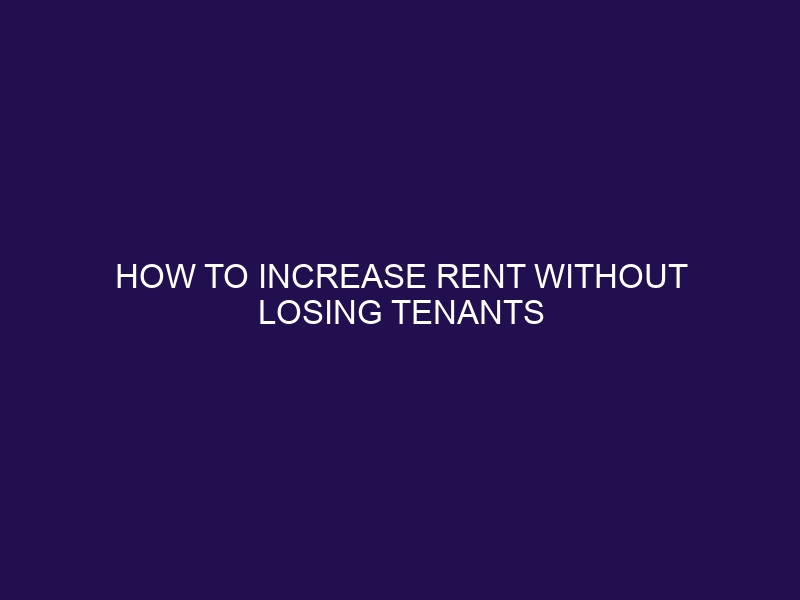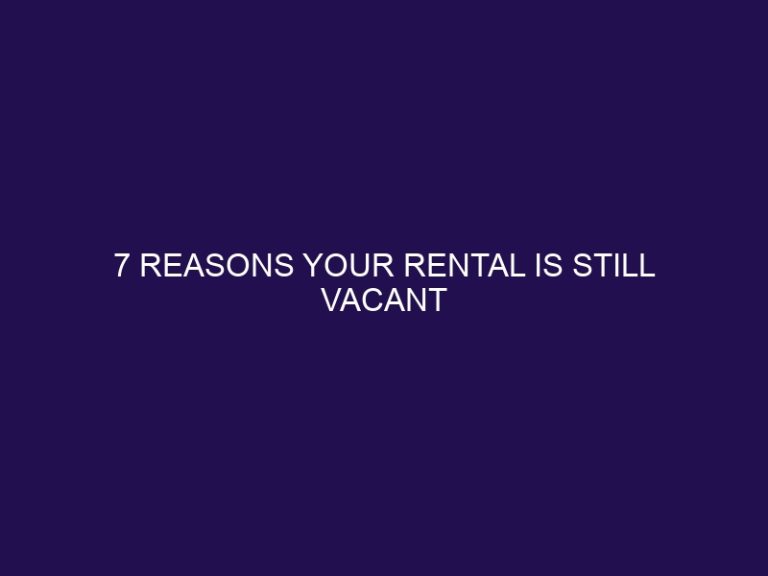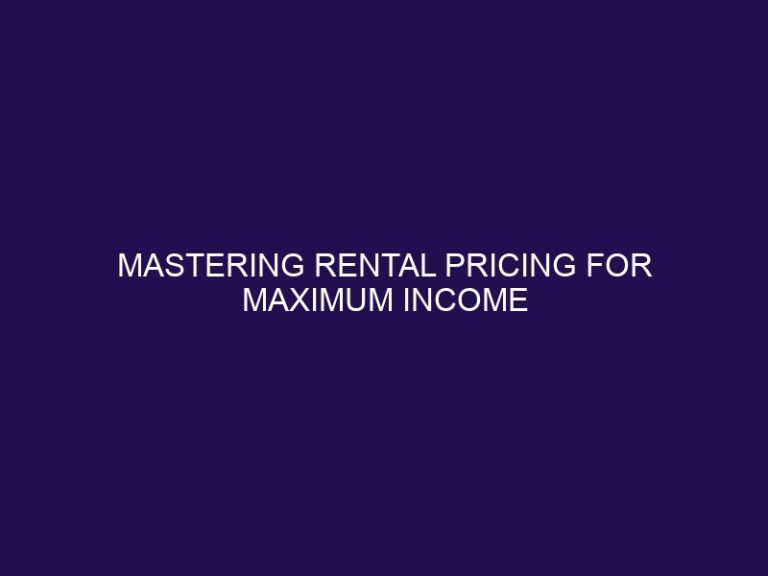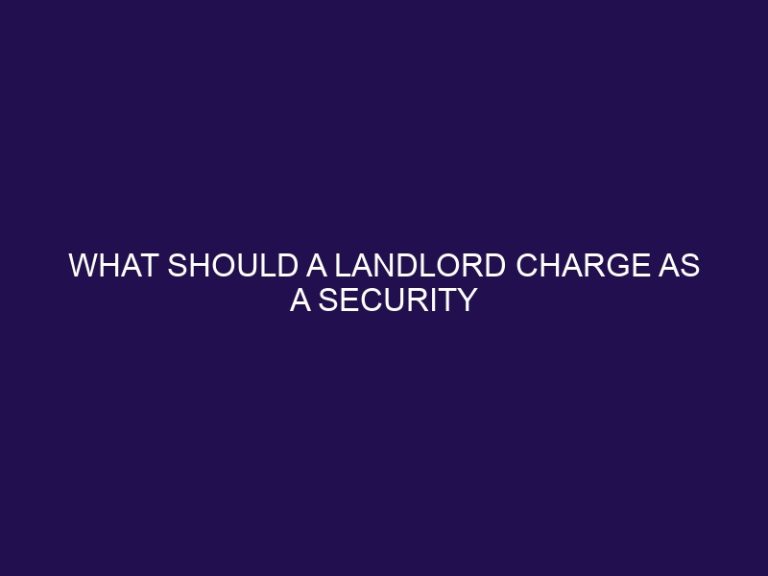How to Increase Rent Without Losing Tenants
As a landlord, increasing rent is a common practice to keep up with market trends and to cover expenses. However, it can also be a delicate situation as it may lead to tenant turnover and vacancies. According to a report by Zillow, rent prices increased by 2.3% in 2020, despite the pandemic. As a professional landlord, it is essential to know how to increase rent without losing valuable tenants. Here are guidelines to follow:
Why Do Landlords Increase Rent?
Landlords may increase rent for various reasons, such as rising property taxes, inflation, or market trends. Increasing rent is also necessary to cover expenses, such as maintenance and repairs, and to ensure a profitable return on investment.
What Are The Factors To Consider Before Increasing Rent?
Before increasing rent, landlords need to consider the following factors:
- Market Trends: Research the rental market in your area to understand the average rent prices and demand for your property type.
- Property Improvements: If you have made significant improvements to the property, it may justify a rent increase.
- Tenant Turnover: If your current tenants are long-term and reliable, it may be better to maintain a good relationship and avoid increasing rent.
How To Increase Rent Without Losing Tenants?
Here are some strategies to increase rent without losing tenants:
- Communicate Effectively: Inform your tenants about the reasons for the rent increase and give them ample notice.
- Offer Incentives: Give your tenants incentives, such as longer lease terms or upgrades, to make the rent increase more appealing.
- Negotiate with Tenants: If your tenants express concerns about the increase, consider negotiating a compromise.
- Gradual Increases: Instead of a significant increase, consider smaller, incremental increases to make it more manageable for your tenants.
What Are The Alternatives To Increasing Rent?
If increasing rent is not a viable option, here are some alternatives to consider:
- Charge For Amenities: If you offer additional amenities, consider charging for them separately instead of increasing rent.
- Implement Late Fees: Implementing late fees can discourage tenants from paying rent late, which can provide additional income.
- Offer Lease Renewal Incentives: Consider offering incentives, such as a lower rent increase or waived fees, for tenants who renew their lease.
- Reduce Expenses: Cut back on expenses, such as utilities or maintenance, to balance the costs.
What Are The Legal Considerations For Increasing Rent?
Before increasing rent, landlords should consider the following legal considerations:
- Check Local Laws and Regulations: Make sure to follow local laws and regulations regarding rent increases.
- Give Proper Notice: Follow the legal guidelines for giving notice to tenants about a rent increase.
- Document the Rent Increase: Document the rent increase in writing and have your tenants sign an updated lease agreement.
In conclusion, increasing rent is a necessary part of being a landlord, but it should be done carefully and with consideration for your tenants. By following these guidelines and considering alternatives, you can successfully increase rent without losing valuable tenants.
Why Do Landlords Increase Rent?
Why Do Landlords Increase Rent?
Landlords increase rent for various reasons, such as keeping up with rising property taxes, maintenance costs, and to generate higher profits. Inflation and market demand also play a role in rental adjustments. In fact, during the post-war period, landlords historically increased rent due to the economic boom and housing shortage.
What Are The Factors To Consider Before Increasing Rent?
As a landlord, increasing rent can be a delicate balance between maximizing profits and retaining valuable tenants. Before making any changes to rental prices, it is important to carefully consider various factors that may impact both the landlord and the tenants. In this section, we will discuss the key elements to keep in mind before increasing rent, including market trends, property improvements, and tenant turnover. By understanding these factors, landlords can make informed decisions that benefit both themselves and their tenants.
1. Market Trends
- Stay Informed: Keep a close eye on real estate market trends, including rental rates and demand in your area.
- Research: Analyze the rental rates of similar properties in your neighborhood to determine if an increase is justified.
- Understand the Market: Consider economic factors impacting the rental market, such as job growth, population shifts, and development projects.
When considering increasing rent, landlords should closely monitor market trends to make informed decisions about adjusting rental rates.
2. Property Improvements
- Inspect the property to identify areas in need of improvement, such as outdated fixtures or worn-out flooring.
- Invest in renovations, such as modernizing kitchens or upgrading amenities, to enhance the property’s appeal and value.
- Consider eco-friendly upgrades, such as energy-efficient appliances or sustainable materials, to attract environmentally conscious tenants.
3. Tenant Turnover
- Assess Reasons: Identify causes of tenant turnover such as rent increase, property condition, or changes in the neighborhood.
- Retention Strategies: Implement measures such as regular maintenance, community events, and responsive communication to decrease turnover.
- Feedback Loop: Gather tenant feedback to address concerns and improve satisfaction.
Pro-tip: Building positive relationships between landlords and tenants can greatly reduce turnover and increase property value.
How To Increase Rent Without Losing Tenants?
As a landlord, increasing rent can be a delicate balancing act. On one hand, you want to maximize your profits and keep up with market rates. On the other hand, you don’t want to lose valuable tenants who may choose to move out if the rent becomes too high. In this section, we will discuss effective strategies for increasing rent without risking the loss of tenants. From clear communication and incentives to negotiation and gradual increases, these tactics can help you achieve a win-win situation for both you and your tenants.
1. Communicate Effectively
- Be Transparent: Clearly explain reasons for rent increase and any added value.
- Provide Notice: Notify tenants well in advance to allow adjustment.
- Listen: Address tenant concerns and negotiate terms if possible.
- Offer Options: Propose flexible payment plans or lease terms.
Effective communication fosters understanding and cooperation, minimizing tenant dissatisfaction.
2. Offer Incentives
- Offer discounts for early rent payments or lease renewals.
- Provide complimentary services like cleaning or lawn maintenance.
- Give incentives such as gym memberships or parking discounts.
3. Negotiate with Tenants
- Open Dialogue: Initiate a transparent conversation with tenants to understand their concerns and negotiate with them.
- Flexible Terms: Offer flexible lease terms or make necessary adjustments to accommodate their needs during negotiations.
- Compromise: Find mutually beneficial solutions, such as phased rent increases or added amenities, during the negotiation process with tenants.
4. Gradual Increases
- Assess market rates and tenants’ affordability.
- Implement small, periodic rent hikes annually or biennially.
- Communicate transparently with tenants about the gradual increases.
- Offer value-added services or improvements to justify the gradual increases.
What Are The Alternatives To Increasing Rent?
As a landlord, you may find yourself in a difficult position when it comes to increasing rent for your tenants. While it may be necessary to cover rising costs, it can also lead to losing valuable tenants. Thankfully, there are alternatives to simply raising the rent. In this section, we will discuss four potential solutions: charging for amenities, implementing late fees, offering lease renewal incentives, and finding ways to reduce expenses. Each of these options can help increase your income without causing strain on your relationship with tenants.
1. Charge For Amenities
- Assess amenities like parking, laundry, or gym access and charge accordingly to provide value.
- Offer tiered amenity packages to give tenants options and flexibility in terms of charges.
- Communicate the benefits of the amenities to justify the additional charges and show the value they bring.
Consider balancing the amenity charges with competitive rental rates to maintain tenant satisfaction and ensure they are getting a fair deal.
2. Implement Late Fees
- Review lease agreements to ensure that they include language regarding late fees.
- Clearly communicate the late fee policy to tenants.
- Establish a reasonable amount for late fees and a grace period.
- Enforce late fees consistently and fairly.
In 1905, the idea of implementing late fees was introduced by a property manager in New York City to ensure timely rent payments during economic fluctuations.
3. Offer Lease Renewal Incentives
- Provide discounted rent for tenants who choose to renew their lease.
- Offer upgrades or improvements to the rented unit as a lease renewal incentive.
- Consider including additional services or amenities for tenants who renew their lease.
Pro-tip: Offering incentives for lease renewal can foster tenant loyalty and reduce turnover, ultimately benefiting both parties.
4. Reduce Expenses
- Assess operational costs for potential reductions.
- Consider energy-efficient upgrades to lower utility expenses.
- Negotiate with vendors for better pricing on services and supplies.
- Implement cost-effective maintenance strategies.
Pro-tip: Regularly review expense reports and seek creative ways to streamline costs without sacrificing quality.
What Are The Legal Considerations For Increasing Rent?
As a landlord, increasing rent can be a tricky and delicate matter. It is important to not only consider the financial aspects, but also the legal implications of such a decision. In this section, we will discuss the key legal considerations that come with increasing rent. From checking local laws and regulations to properly notifying tenants, we will provide valuable insights on how to navigate this process while maintaining a positive relationship with your tenants.
1. Check Local Laws and Regulations
- Research the rental laws and regulations in your local area regarding rent increases.
- Make sure to understand the legal requirements for notifying tenants about any adjustments to their rent.
- Be sure to properly document the entire rent increase process in order to comply with all local regulations.
Suggestions: It is crucial to always prioritize compliance with local rental laws to avoid any potential legal issues and maintain positive relationships with your tenants.
2. Give Proper Notice
- Review local laws and regulations to understand the notice period required for rent increase.
- Provide written notice to tenants within the specified time frame, clearly stating the new rent amount and effective date.
- Keep documentation of the notice for record-keeping and legal purposes.
It is essential to give proper notice to maintain transparent relationships between landlords and tenants and to comply with legal obligations.
3. Document the Rent Increase
- Review Lease Agreement: Ensure the lease permits rent increases and adheres to local laws.
- Provide Written Notice: Document the rent increase in writing, specifying the new amount and effective date.
- Keep Records: Maintain records of all communication and notices regarding the rent increase.
Frequently Asked Questions
How can I raise rent without losing tenants?
The first step is to conduct thorough market research to determine the going rate for rent in your neighborhood. Consider expenses such as property taxes, utility costs, HOA dues, insurance premiums, and maintenance when calculating how much to raise the rent. Communicate with your tenants by providing written notice and explaining the reason for the increase. Consider offering incentives or negotiating with tenants to ease the impact of the rent increase. It is also important to regularly review and adjust rent to stay competitive in the market.
What are some good resources for learning about raising rent?
TransUnion Rental Screening Solutions, Inc. provides educational resources for landlords on how to raise rent and the importance of conducting market research. SMARTER Real Estate Investing offers a comprehensive program for investors to learn and improve their skills in the real estate market, including interactive bootcamps, videos, webinars, and more. Local meetups and events can also provide valuable insights and networking opportunities for landlords.
When is it necessary to raise rent?
Raising rent can help maintain a profitable business, keep up with expenses, and maintain a positive cash flow. It is also important to consider the current market conditions and how much rent has increased since 2011. However, it is important to avoid raising rent too high, as this may result in tenant complaints and the loss of good tenants.
How should I communicate with tenants about a rent increase?
Provide written notice in accordance with local laws and regulations and explain the reason for the increase. Consider offering incentives or negotiating with tenants to ease the impact of the rent increase and maintain a good relationship. It is important to provide proper notice and follow legal limitations when raising rent.
What are some tips for finding the right rent amount to raise to?
Conduct thorough market research to determine the going rate for rent in your neighborhood. Consider expenses such as property taxes, utility costs, and maintenance when calculating how much to raise the rent. Check rental listings and use tools such as Rentometer and Airbnb rent estimator to quickly match nearby market rates. It may also be helpful to consult with property managers and real estate agents for their insights.
How can I minimize turnovers and avoid losing good tenants when raising rent?
To minimize turnovers, consider offering incentives or negotiating with tenants when raising rent. It is also important to regularly review and adjust rent to stay competitive in the market and maintain positive cash flow. Building a good team of vendors and partners, such as property managers and tax professionals, can also help in managing rental investments and reduce the chances of costly turnovers.







